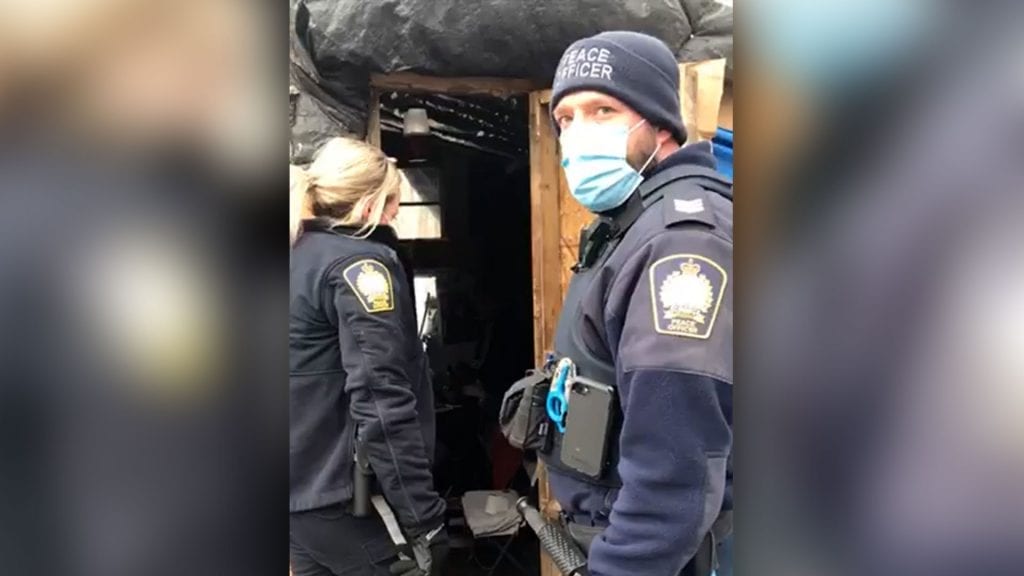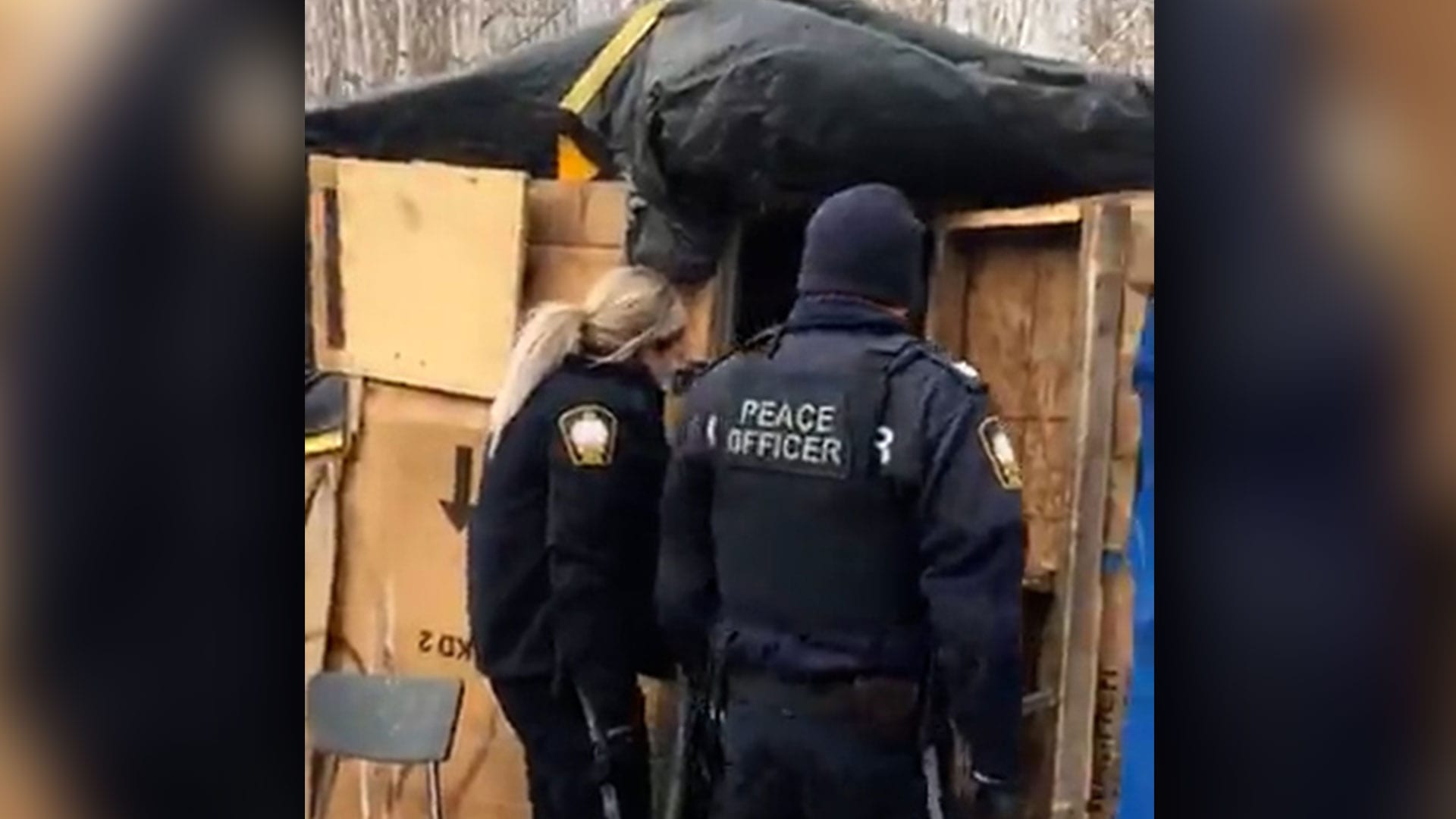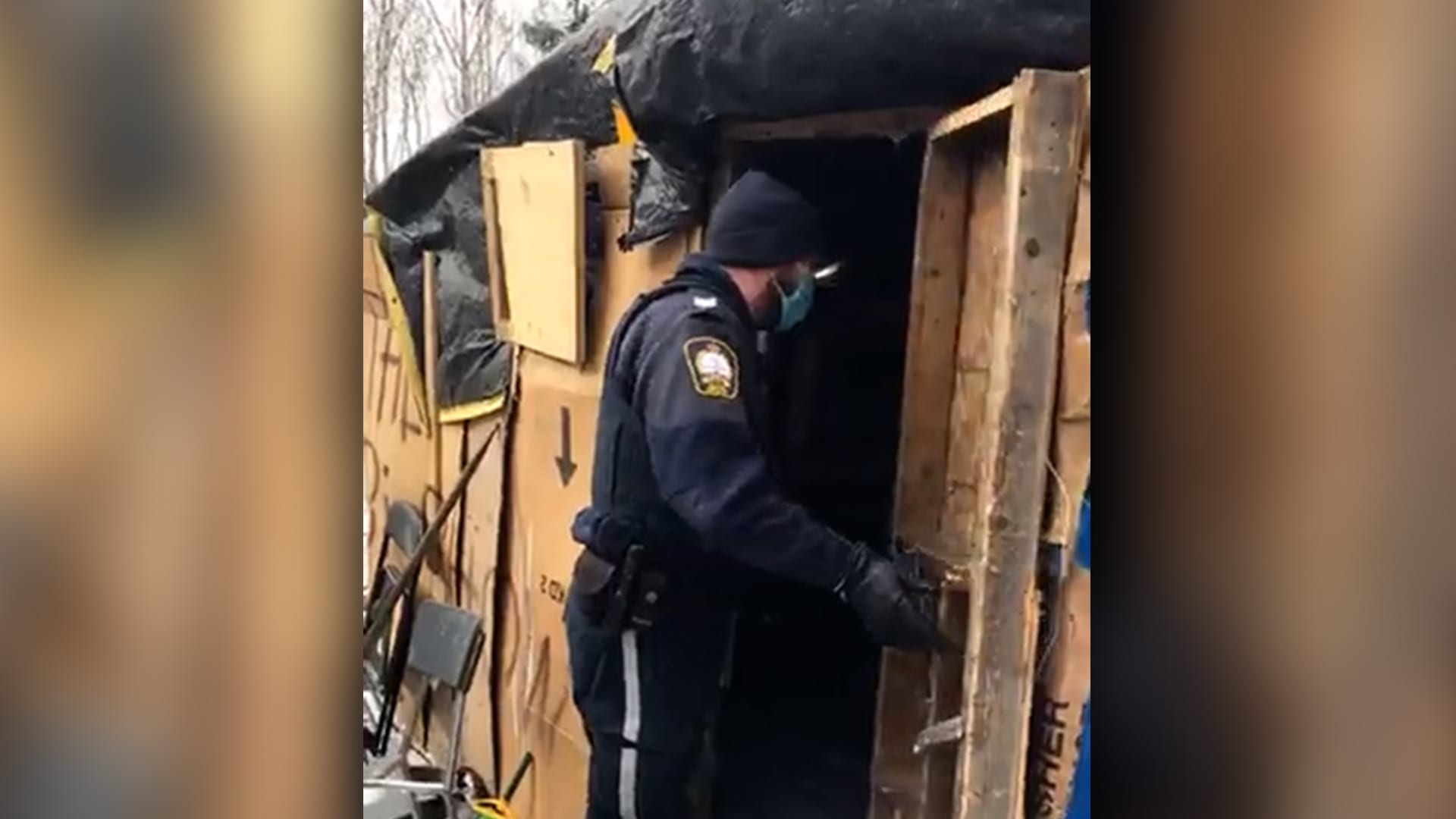
Lac La Biche peace officer looks at the camera of a First Nations advocate. Photo: APTN
A small community in northwestern Alberta says it dismantled a homeless camp on private property last week after receiving complaints about criminal activity.
But advocates for the dozen or so First Nation and Métis peoples evicted from the homemade shacks are calling for compassion.
“I seen a very sad situation is what I seen,” said Jason Ekeberg of Métis Nation of Alberta Region 1, who was there as the camp was destroyed.
“We have to support them, they’re human beings.”
Ekeberg said Métis officials have repeatedly sought a meeting with elected representatives of the hamlet of Lac La Biche, a sprawling county about two hours northwest of Edmonton.
“We don’t have dollars to buy land,” Ekeberg said, noting he hoped the hamlet’s council would lease them public land “for a dollar a year.
“Hopefully there still is goodwill with people out there. I don’t know if there is anymore but there should be.”
WATCH:
Lac La Biche officials sent police and peace officers to dismantle a homeless camp on private property. Video: Submitted
Mayor Omer Moghrabi said he has scheduled a special council meeting this week to discuss the homeless camp controversy.
He said the municipality acted on a request from the landowner to remove the group squatting on non-serviced, rural property for about two years.
“They’re living on private land; they set up these kind of houses with cardboard…there was some criminal activity associated with people coming there,” Moghrabi told APTN News.
Lisa Marie Bourque, a local Métis woman and advocate, used her phone to film camp residents preparing for eviction.
“They can’t afford rent, that’s why they’re there,” she said of the 10 men and two women living in “ramshackle accommodation” forged from scraps of lumber, cardboard and tarps.
“There’s no options for people that are low income. These are houseless people.”
Bourque said the landowner was worried he “would be fined if he didn’t comply…and be held liable for (criminal) charges, littering” if the camp didn’t close.

She said the hamlet “sent bulldozers, they got chainsaws and they got county employees and they have police and peace officers.”
She said officials with the Métis Nation visited the site prior to the eviction after she contacted them.
“They actually talked to the people to find out what their needs were. They tried to stop the process of the dismantling and forceful removal.”
Borque said camp members are Métis and First Nations peoples.
“I believe the solution is consultation with our elected Indigenous leaders because they’re going to know how to deal with the people,” she said in an interview.
“That’s something that has never been granted by this Mayor Omer Moghrabi. He’s never once consulted them throughout the entire process even though they have reached out to him.”
In the video, a woman living in one of the shacks identifies herself as being from Onion Lake First Nation in neighbouring Saskatchewan. She said she supports herself and her adult daughter by recycling bottles.
WATCH:
Members of the camp are First Nation and Métis peoples. Video: Submitted
The property owner could not be reached for comment.
James Cardinal, president of Métis Nation Region 1 in Lac La Biche, said the situation calls for empathy not aggression.
“They move them from one camp to another…no one has done anything,” he said via phone.
“I asked the mayor last week for us to meet and start discussing this homeless problem that we have…and maybe get a piece of land somewhere and we’ll take the responsibility.”
Cardinal noted addiction problems need special attention.
“This is what colonialism has put us through, and with that we suffer today; our people suffer. And it’s time leadership step up.”
Moghrabi said the hamlet has been warning camp members they’d be closed down because of worries around COVID-19 transmission and hazards associated with fires and garbage.

“That’s not an order made by the mayor,” he added, “that’s a council decision.”
Moghrabi said the hamlet has a small homeless shelter and a task force on homelessness that has reached out to the provincial and federal governments for funding, and mental health and addiction services.
“I’m not going in camera,” he said of the special council meeting to be broadcast virtually. “I want people to talk.”
Ekeberg said homeless camp members “just kind of want to be left alone” until they’re ready to seek support.
“We have to sit at the table, put the bureaucracy aside, and start talking to these people to come up with a plan. What they’re doing is just pushing people from spot to spot.”









